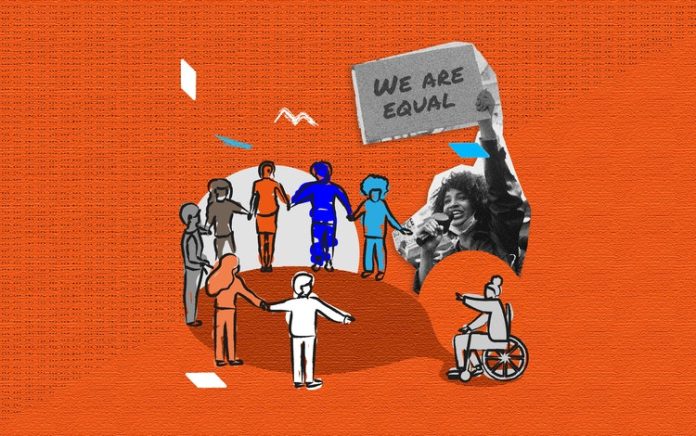We are all born into a culture and socialized to fit into its norms. We learn language, mannerisms, religion, and gender roles. This isn’t inherently a bad thing; it helps us function in society and understand the surrounding world. However, we must always critically think about the information we are consuming about the world around us, especially when it comes to understanding marginalized groups. Marginalized groups are those that do not have power or privilege in society due to their demographic or social position (race, gender identity, sexual orientation, disability/disability identity, citizenship/legal status/citizenship status, size/height/weight).
When you’re trying to learn about a marginalized group of people, you might be feeling a bit overwhelmed. The first thing to keep in mind is that this process is all about opening yourself up to new ideas and seeing the world from a different perspective. If you’re someone who doesn’t spend much time with LGBTQ+ people or isn’t in tune with what their needs are, it can be easy to feel like you’re the only one who doesn’t know everything there is to know about that community. However, everyone has areas where they aren’t as informed as they’d like to be; it’s natural for this kind of learning process to feel intimidating at times. The important thing is to not let that feeling overwhelm you or get in the way of your progress.
There are lots of ways you can learn about LGBTQ+ issues, and it’s important to make sure you’re exposed to positive information if you want your attitude towards these issues to change for the better. Make an effort to seek out a wide variety of experiences so that you can see how diverse LGBTQ+ people are. You’ll find that there are far more similarities among us than differences.
Watch films based on the LGBTQ+ experience that tackle difficult circumstances such as a conversion therapy movie. Movies like “Conversion” offer insight into the struggles that members of the LGBTQ+ community have faced that were enforced by societal narratives. Read books and stories written by LGBTQ+ authors. Films and books can help you understand what it means to be marginalized and made to feel othered or ostracized. But don’t stop at documentaries and non-fiction, absorb materials that demonstrate the multifaceted lives of marginalized groups. From rom-coms to dramas, there is plenty of content out there to make you laugh, cry and think.
It’s important to remember that when learning, you have to put your ego aside and be open-minded. If someone says something that hurts your feelings or challenges your identity or makes you feel uncomfortable, it doesn’t mean they’re attacking you personally. It means they’re opening up a conversation with you, and they’re hoping that you’ll consider their perspective and engage with them as equals.
Accepting that you don’t know everything is a great first step in fighting oppression. When you learn something new, it allows you to approach the people around you with more empathy and understanding, hopefully breaking down prejudices and stereotypes that afflict any number of minorities. For example, if someone tells you how they identify, or an experience they had with prejudice, or even just an aspect about their culture that seems different from yours, instead of getting defensive, try to be open-minded about it. If you don’t understand where they’re coming from or why they hold a certain belief, ask questions. This can help prevent assumptions; maybe there’s something about their life that you didn’t know before. In turn, the next time someone asks you about your identity or beliefs, be open about it! If people don’t know much about your background and are curious, let them ask questions. It’s not because they can never fully understand who you are as a person; everyone has their own life experiences that make each person unique. Just like with creating safe spaces for marginalized groups in our own communities, we have to create safe spaces for ourselves and allow ourselves to grow. Education is key to helping us do this.
We all have our own unique ways of learning about the world around us, but let’s be honest—we could stand to learn a lot more. It’s easy to understand that a lack of education on a certain topic makes it difficult to discuss that topic in an informed and respectful way. But even if you’ve heard about something often enough to consider yourself educated, it’s still possible for your perspective to be skewed or for you to have information gaps. That’s where privilege comes into play. We all have different privileges, whether we realize it or not, and these privileges can make it easier or harder for us to understand what someone is going through, depending on which privilege(s) apply.
The most important thing to remember is, that this is not just your responsibility, it’s our responsibility as a society. Watching a conversion therapy movie, reading books and articles are all important steps toward better understanding. We all have a stake in making sure that everyone feels welcomed and included in our communities, not only because it’s the right thing to do but because it makes for a stronger society. Educating ourselves about other groups and actively seeking out opportunities to discuss issues will help us achieve this goal. The onus does not fall solely on those with the greatest privilege within any given community: it takes effort from everyone to bring about change.
















